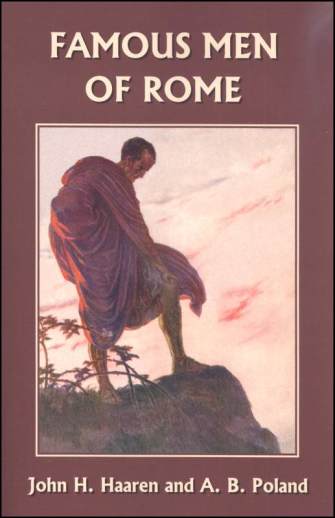We use cookies to make your experience better. To comply with the new e-Privacy directive, we need to ask for your consent to set the cookies. Learn more.
Famous Men of Rome
SKU
044858
ISBN
9781599150468
Grade 4-AD
These icons are designed to help you quickly understand and learn important information about our products.
Teaching Method
Traditional
Teacher-centered curriculum commonly used in classrooms that may include a text, teacher manual, tests, etc.
Charlotte Mason
A methodology based on the work of a 19th century educator who maintained that children learn best from literature (Living Books), not textbooks.
Classical
A methodology based on the Latin Trivium (three stages of learning), including the grammar stage (memorization and facts), logic stage (critical thinking), and rhetoric stage (developing/defending ideas).
Unit Study
A thematic or topical approach centered around one topic that integrates multiple subject areas.
Montessori (Discovery)
A methodology based on the work of a 20th century educator that emphasizes student and sensory-driven discovery learning and real-life applications.
Other
Other methodologies
Religious Content
Secular
Contains content contrary to common Christian beliefs (i.e. evolution).
Neutral
Avoids religious or theoretical topics or presents multiple viewpoints without preference.
Christian/Religious
Faith-based or including instructional religious content.
Learning Modality
Auditory
Learns through listening, talking out loud or reading out loud.
Visual
Learns through seeing, prefers written instructions and visual materials.
Kinesthetic/Tactile (Hands-On)
Learns through moving, doing and touching.
Multi-Sensory
Curriculum that employ a variety of activities/components.
Presentation
Sequential
Curriculum progresses through well-defined learning objectives. Emphasizes mastery before moving to the next topic.
Spiral
Topics and concepts are repeated from level to level, adding more depth at each pass and connecting with review.
Conceptual/Topical
Focus is on the “why,” often with a unifying concept as well as specific skills; coverage may be broader.
Teacher Involvement
Low Teacher Involvement
Student-led materials; parent acts as a facilitator.
Medium Teacher Involvement
A mix of teacher-led time and independent student work.
High Teacher Involvement
Teacher-led lessons; may utilize discussions, hands-on activities and working together.
Additional Materials Required
No other materials needed
Everything you need is included.
Other Materials Required
There are additional required resources that are a separate purchase.
Other Materials Optional
There are additional resources mentioned or recommended but are not absolutely necessary.
Consumable
Consumable
Designed to be written in; not reusable.
Non-Consumable
Not designed to be written in; reusable.
Our Price
$15.95 $15.95 $13.95
Rainbow Savings: $2.00
Description
Publisher's Description of Famous Men of Rome
Attractive biographical sketches of twenty-eight of the most prominent characters in the history of ancient Rome, from its founding to its fall. Includes most of the best known characters from the kingdom and republic of Rome, as well as the most prominent personages from the imperial age. Each story is told in a clear, simple manner, and is well calculated to awaken and stimulate the youthful imagination.
Category Description for Famous Men of... Series
The impact that stories of world-changing men have on the overall learning experience cannot be overestimated. By providing children with a means to connect on a one-on-one basis with each individual, the study of history can really come to life. Each book provides a collection of approximately 30 stories highlighting prominent historical figures like Alexander the Great, Ptolemy, Marcus Aurelius, Julius Caesar, Charlemagne, and William the Conqueror. These books have been published by Yesterday's Classics and are unabridged replications of the 1904 originals by American Book Company. -Enh
Details
| Product Format: | Softcover Book |
|---|---|
| Grades: | 4-AD |
| Brand: | Yesterday's Classics |
| Author: | John H. Haaren and A.B. Poland |
| ISBN: | 9781599150468 |
| Length in Inches: | 0.588 |
| Width in Inches: | 6 |
| Height in Inches: | 9 |
| Weight in Pounds: | 0.853 |
Videos
Reviews

